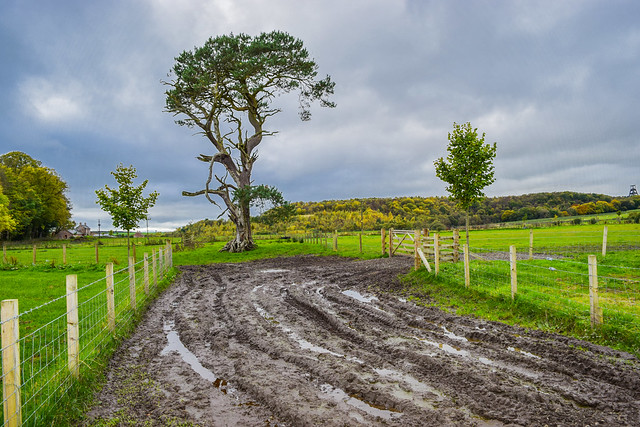Words for grind, crush, mill and related things in Celtic languages.
Words marked with a * are reconstructions.
| Proto-Celtic | *malati = to grind, crush |
|---|---|
| Old Irish (Goídelc) | meilid = to crush, grind, sharpen, eat con·meil = to grind together |
| Middle Irish (Gaoidhealg) | melaid, meilid = to grind, crush, sharpen, use, consume (esp. food) con-meil, coimlid, cuimlid, comlaid = to rub, grind together, attach, consume, destroy |
| Irish (Gaeilge) | meil [mʲɛlʲ] = to grind, crush meilim = to grind meilt = grinding, crushing, consuming, spending, wasting, incessant talk meilteach = grinding, crushing, consuming meilteoir = grinder, crusher meilteoireacht = (act of) grinding, crushing meiltire = incessant talker, chatterer |
| Scottish Gaelic (Gàidhlig) | meil [mel̪] = (to) grind, mill, pulverize, masticate meileach [meləx] = grinding, pertaining to or abounding in grinders/mills; finely ground flour meileadh [mɛl̪ʲɛvadʲ] = grinding, milling, pulverizing, masticating meilt [meldʲ] = grinding meilte [meldʲə] = ground, milled, pulverized, masticated meiltear, meileadair [meldʲər / melədɪrʲ] = grinder |
| Manx (Gaelg) | beihll = to grind, pulverize; pulverization beihlleyder = grinder, pulverizer beihllinder = grinder bleih = grind, grist; duffer, halfling, hobbledehoy, ninny, triffler bleihit = ground bleihder = grinder, molar |
| Proto-Brythonic | *malɨd = to grind, crush |
| Middle Welsh (Kymraec) | malu, mâlu = to grind, crush, pulverise, break, shatter, smash |
| Welsh (Cymraeg) | malu [ˈma(ː)li] = to grind, crush, pulverise, break, shatter, smash, trample, chop, sharpen, destroy, utter, speak, recite (poetry) malu awyr = to talk idly, talk nonsense, blather (“to grind air”) malaid = finely ground, ground to a powder malurio = to break into fragments, shatter, smash, grind, crumble, reduce to dust, pulverise malwr [ˈmalʊr / ˈma(ː)lʊr] = grinder, mincer, molar, miller; speaker, utterer, babbler, chatterer |
| Middle Cornish (Cernewec) | melias = to reduce, power, grind |
| Cornish (Kernewek) | mala = to grind maler = grinder melyas = to grind |
| Old Breton (Brethonoc) | malaff = to grind |
| Middle Breton (Brezonec) | malaff = to grind |
| Breton (Brezhoneg) | malañ [ˈmɑːlã] = to grind, cruse, seize malad = ground things maladeg, maladur = grinding maler [ˈmɑːlɛr] = miller malerez [ma.leː.res] = grinder, vegetable mill |
Etymology: from the Proto-Indo-European *ml̥h₂-é-ti, from *melh₂- (to crush, grind). Words from the same roots include maelstrom (a large and violent whirlpool) and meal (the coarse-ground edible part of various grains often used to feed animals) in English, moudre (to grind), meule (grindstone, millstone) and moulin (mill, windmill) in French, and moler (to grind, mill), and words for mill in Celtic languages – see below [source].
| Old Irish (Goídelc) | muilend = mill muileóir = miller |
|---|---|
| Middle Irish (Gaoidhealg) | muilend, muilund = mill muileóir, moilleóir = miller |
| Irish (Gaeilge) | muileann [ˈmˠɪlʲən̪ˠ] = mill, grinding apparatus, manufactory muileann uisce = watermill muileann gaoithe = windmill, pinwheel muileann iarainn = ironworks muileann sábhadóireachta = sawmill muileóir = miller, mill owner muileóireacht = (act of) milling |
| Scottish Gaelic (Gàidhlig) | muileann [mul̪ʲən̪ˠ] = mill muileann-gaoithe = windmill muileann-sàbhaidh = sawmill muileann-uisge = watermill muilear [mul̪ʲər] = miller muilearachd [mul̪ʲərəxg] = milling, grinding |
| Manx (Gaelg) | mwyllin = mill, factory mwyllin geayee = windmill mwyllin saaual = sawmill mwyllin ushtey = watermill mwyllar = miller, mill owner mwyllaragh, mwyllarys = milling |
| Proto-Brythonic | *melɨn = mill |
| Middle Welsh (Kymraec) | melyn, melin = mill melin wynt = windmill melina = to grind, mill melinyt, melinyd, melinid = miller, grinder |
| Welsh (Cymraeg) | melin [ˈmɛlɪn] = mill, factory melin wynt = windmill melin lif(anu) = sawmill melin ddŵr = watermill melina(f), melino = to grind, mill melinwr = miller, mill owner melinydd = miller, grinder, molar melinyddiaeth = the craft of milling |
| Old Cornish | melin = mill |
| Middle Cornish (Cernewec) | melin, belin = mill |
| Cornish (Kernewek) | melin, belin = mill melin dhowr = watermill melin wyns = windmill meliner / melinores, belender = miller melinji = millhouse |
| Old Breton (Brethonoc) | molin = mill |
| Middle Breton (Brezonec) | melin = mill |
| Breton (Brezhoneg) | milin, melin [ˈmiː.lĩn] = mill, factory milin-avel [mi.lĩ.ˈnɑː.vɛl] = windmill milin-dour, melin-dour [milĩnˈduːr] = watermill milinan, milinañ = to mill, rotate miliner, meilher = miller milinerezh = milling |
Etymology: from Late Latin molinum (a mill), from molīnus (mill), molō (to grin or mill), from Proto-Italic *melō (to grind), from Proto-Indo-European *mélh₂-ti, from *melh₂- (to grind, crush) [source].
Sources: Wiktionary, Am Faclair Beag, Online Manx Dictionary, Teanglann.ie, eDIL – Electronic Dictionary of the Irish Language, In Dúil Bélrai English – Old Irish glossary, Geiriadur Prifysgol Cymru, Gerlyver Kernewek, Dictionaire Favereau, TermOfis, English – ProtoCeltic WordList (PDF), Etymological Dictionary Of Proto Celtic











